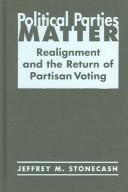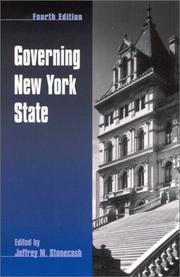| Listing 1 - 10 of 15 | << page >> |
Sort by
|

ISBN: 1588263940 158826369X 9781588263940 9781588263698 Year: 2006 Publisher: Boulder, Colo. Lynne Rienner Publishers
Abstract | Keywords | Export | Availability | Bookmark
 Loading...
Loading...Choose an application
- Reference Manager
- EndNote
- RefWorks (Direct export to RefWorks)
Party affiliation --- Political parties --- Voting --- Partis politiques --- Vote --- History. --- Adhésion --- Histoire --- History --- Adhésion --- United States --- Party affiliation - United States --- Party affiliation - United States - History --- Political parties - United States --- Political parties - United States - History --- Voting - United States --- Voting - United States - History
Book
ISBN: 9780521733229 9780511756184 9780521515511 051147976X 9780511479762 9780511480560 0511480563 0521515513 0521733227 0511756186 1107190517 051173722X 9786612001420 1282001426 051147735X 0511475918 0511478879 Year: 2008 Publisher: Cambridge, UK Cambridge University Press
Abstract | Keywords | Export | Availability | Bookmark
 Loading...
Loading...Choose an application
- Reference Manager
- EndNote
- RefWorks (Direct export to RefWorks)
Incumbents in the US House of Representatives have increased their vote percentages in recent decades, raising questions about the efficacy of elections in making members responsive. The evidence, however, indicates there has been no improvement in the electoral fortunes of incumbents in the last 50 years. Only Republicans have improved their electoral fortunes as a result of realignment. This valuable book provides a very different interpretation of how incumbents have fared in recent decades, and the interpretation is supported by non-technical data analysis and presentation.
Incumbency (Public officers) --- United States --- Elections --- Public officers --- Social Sciences --- Political Science

ISBN: 0791491048 0791448886 9780791448885 9780791491041 Year: 2001 Publisher: Albany State University of New York Press
Abstract | Keywords | Export | Availability | Bookmark
 Loading...
Loading...Choose an application
- Reference Manager
- EndNote
- RefWorks (Direct export to RefWorks)
New York (State) --- Nyu Yorḳ (State) --- NYS --- Niyū Yūrk (State) --- Nʹi︠u︡-Ĭork (State) --- Shtat Nʹi︠u︡ Ĭork --- State of New York --- State of N. York --- NY (State) --- N.Y. (State) --- N. York (State) --- نيويورك (State) --- ولاية نيويورك --- Wilāyat Niyū Yūrk --- Штат Нью-Ёрк --- Нью-Ёрк (State) --- Ню Йорк (State) --- Nova York (State) --- С̧ӗнӗ Йорк (State) --- Śĕnĕ Ĭork (State) --- Efrog Newydd (State) --- Kin Yótʼááh Deezʼá Hahoodzo --- Nííyóó Hahoodzo --- New Yorgi osariik --- Νέα Υόρκη (State) --- Nea Yorkē (State) --- Πολιτεία της Νέας Υόρκης --- Politeia tēs Neas Yorkēs --- Nueva York (State) --- Estado de Nueva York --- Nov-Jorkio --- Ŝtato de Nov-Jorkio --- État de New York --- Nua-Eabhrac (State) --- York Noa (State) --- Eabhraig Nuadh (State) --- Estado de Nova York --- Néu-Yok (State) --- Шин Йорк (State) --- Shin Ĭork (State) --- 뉴욕 주 --- Nyuyok-ju --- 뉴욕 (State) --- Nyuyok (State) --- Nuioka (State) --- Nú Yọk (State) --- Tchiaq York (State) --- New York Isifunda --- New York-fylki --- ניו יורק (State) --- מדינת ניו יורק --- Medinat Nyu Yorḳ --- Stat Evrek Nowydh --- Evrek Nowydh (State) --- Nou Yòk (State) --- Novum Eboracum (State) --- N̦ujorka (State) --- Niujorko valstija --- Niujorkas (State) --- Niorche (State) --- Њујорк (State) --- Njujork (State) --- Yancuīc York (State) --- ニューヨーク州 --- Nyū Yōku-shū --- ニューヨーク (State) --- Nyū Yōku (State) --- New York (Colony) --- Politics and government --- Economic policy. --- Social policy.
Book
ISBN: 9781139333733 9781107029484 9781107616752 9781139776981 1139776983 1283741482 9781283741484 1139333739 1107029481 1107616751 1139794388 1316090302 110725485X 1139780026 1139783017 Year: 2012 Publisher: New York Cambridge University Press
Abstract | Keywords | Export | Availability | Bookmark
 Loading...
Loading...Choose an application
- Reference Manager
- EndNote
- RefWorks (Direct export to RefWorks)
This study proposes and assesses an alternative explanation of the changes in the relationship between presidential and House of Representatives election results during the last century. Jeffrey M. Stonecash argues that the separation of presidential and House election results that occurred from the 1960s to 1980 was a party-driven process, with both parties seeking to change their electoral base. Republicans sought a more conservative electoral base to counter what they saw as disturbing liberal trends in the nation. Democrats sought to reduce their reliance on the South and its conservativism. Presidential and House election results changed at different rates, creating an appearance that they were unconnected, but they eventually came together. Although many saw these changes in election results as evidence of parties' decline, this study reaffirms their position as central actors in bringing about change.
Elections -- United States -- History. --- Political parties -- United States. --- Presidents -- United States -- Election. --- United States. Congress -- Elections. --- Elections --- Presidents --- Political parties --- Government - U.S. --- Law, Politics & Government --- Political Rights - U.S. --- History --- Election --- Social Sciences --- Political Science --- History. --- Election. --- United States. --- Elections.
Book
ISBN: 9780415805247 Year: 2010 Publisher: New York London Routledge
Abstract | Keywords | Export | Availability | Bookmark
 Loading...
Loading...Choose an application
- Reference Manager
- EndNote
- RefWorks (Direct export to RefWorks)
Book
ISBN: 9781685850869 Year: 2022 Publisher: Boulder
Abstract | Keywords | Export | Availability | Bookmark
 Loading...
Loading...Choose an application
- Reference Manager
- EndNote
- RefWorks (Direct export to RefWorks)
Digital
ISBN: 9781685850869 Year: 2022 Publisher: Boulder Lynne Rienner Publishers
Abstract | Keywords | Export | Availability | Bookmark
 Loading...
Loading...Choose an application
- Reference Manager
- EndNote
- RefWorks (Direct export to RefWorks)
Book
ISBN: 0899460763 Year: 1981 Publisher: Cambridge, Mass. Oelgeschlager, Gunn & Hain
Abstract | Keywords | Export | Availability | Bookmark
 Loading...
Loading...Choose an application
- Reference Manager
- EndNote
- RefWorks (Direct export to RefWorks)
Criminal law. Criminal procedure --- United States --- United States of America
Book
ISBN: 0190239840 Year: 2015 Publisher: New York : Oxford University Press,
Abstract | Keywords | Export | Availability | Bookmark
 Loading...
Loading...Choose an application
- Reference Manager
- EndNote
- RefWorks (Direct export to RefWorks)
America is divided by two clashing views about individual responsibility. Liberals see many people as not completely responsible for the situation they are in, their opportunities limited by their class, race, and sex. Distribution of outcomes is therefore seen as unjust, and the government has to help offset the limits people face. In contrast, conservatives believe individuals can and must live their lives with a presumption of personal responsibility for what happens. Government assistance is not seen as valuable, but as creating dependency and ultimately crippling to those who receive it.
Liberty --- Responsibility --- Divided government --- Polarization (Social sciences) --- Political parties --- Right and left (Political science) --- Political planning --- Law, Politics & Government --- Human Rights --- United States --- Social policy. --- Social conditions. --- Politics and government. --- Planning in politics --- Public policy --- Planning --- Policy sciences --- Politics, Practical --- Public administration --- Left (Political science) --- Left and right (Political science) --- Right (Political science) --- Political science --- Social groups --- Social influence --- Opposition (Political science) --- Accountability --- Moral responsibility --- Obligation --- Ethics --- Supererogation --- Civil liberty --- Emancipation --- Freedom --- Liberation --- Personal liberty --- Democracy --- Natural law --- Equality --- Libertarianism --- Social control --- Government --- History, Political
Book
ISBN: 9780521708876 9780511805424 9780521882309 0511595395 9780511595394 9780511651380 0511651384 9780511593468 0511593465 051180542X 0521882303 0521708877 0511698976 9780511698972 1107199980 9781107199989 0511592531 9780511592539 Year: 2009 Publisher: Cambridge Cambridge University Press
Abstract | Keywords | Export | Availability | Bookmark
 Loading...
Loading...Choose an application
- Reference Manager
- EndNote
- RefWorks (Direct export to RefWorks)
Dynamics of American Political Parties examines the process of gradual change that inexorably shapes and reshapes American politics. Parties and the politicians that comprise them seek control of government in order to implement their visions of proper public policy. To gain control parties need to win elections, and winning elections requires assembling an electoral coalition that is larger than that crafted by the opposition. Uncertainty rules and intra-party conflict rages as different factions and groups within the parties debate the proper course(s) of action and battle it out for control of the party. Parties can never be sure how their strategic maneuvers will play out, and, even when it appears that a certain strategy has been successful, party leaders are unclear about how long apparent success will last. Change unfolds slowly, in fits and starts.
Political parties --- History --- United States --- Politics and government --- History. --- Social Sciences --- Political Science --- Political parties - United States - History --- United States - Politics and government - 1865-1933 --- United States - Politics and government - 20th century --- United States - Politics and government - 2001-2009
| Listing 1 - 10 of 15 | << page >> |
Sort by
|

 Search
Search Feedback
Feedback About UniCat
About UniCat  Help
Help News
News